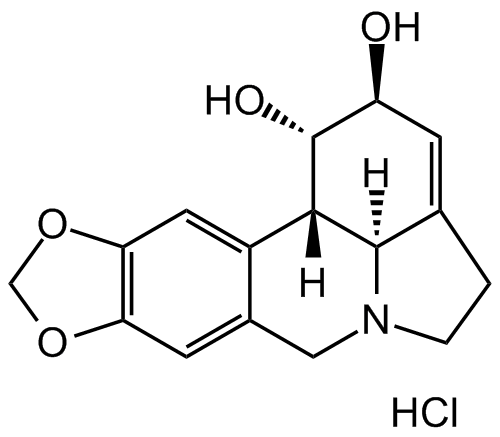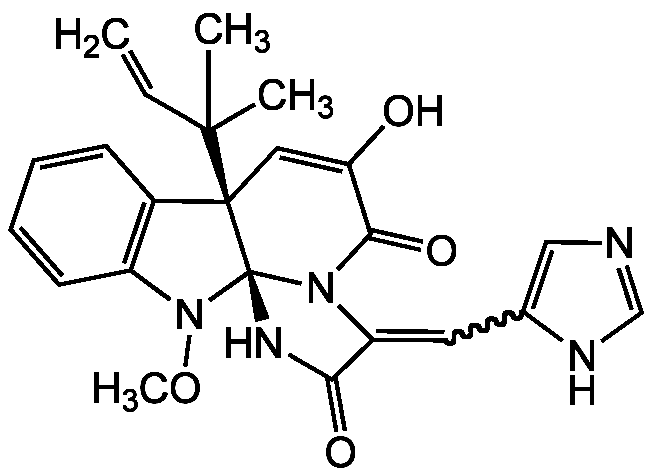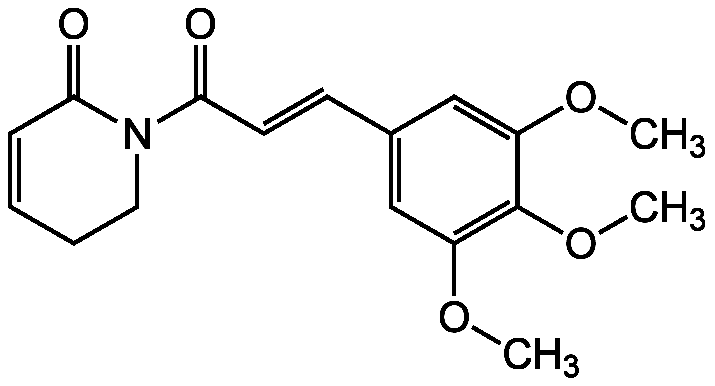
Chemical Structure
Lycorine hydrochloride
CDX-L0129
CAS Number2188-68-3
Product group Chemicals
Estimated Purity>98%
Molecular Weight323.77
Overview
- SupplierChemodex
- Product NameLycorine hydrochloride
- Delivery Days Customer10
- CAS Number2188-68-3
- CertificationResearch Use Only
- Estimated Purity>98%
- Hazard InformationDanger,Excepted quantity
- Molecular FormulaC16H17NO4 . HCl
- Molecular Weight323.77
- Scientific DescriptionChemical. CAS: 2188-68-3. Formula: C16H17NO4 . HCl. MW: 323.77. Lycorine is an active alkaloid abundant in Amaryllidaceae with a wide range of biological properties, including antifungal, antiparasitic, antiviral, anti-inflammatory and anticancer activity. It is a protein synthesis by preventing amino acid incorporation into proteins, potentially through the inhibition of peptidyltransferases. Lycorine induces cell cycle arrest and cell death in Trichomonas. As anticancer agent on a molecular basis it induces G0/G1 phase cell cycle arrest and apoptosis, inhibits activity of histone deacetylases (HDACs), upregulates expression of p53 and p21, downregulates expression of cyclin D1 and CDK4, inhibits the Wnt/beta-catenin pathway, activates ROCK1and inhibits JAK/STAT pathways. Lycorine exhibits antiviral activities against enterovirus, flaviviruses, Zika virus, HIV-1, SARS-CoV, SARS-CoV-2 and hepatitis C virus, most probably by suppressing viral replication. Lycorine has been shown to inhibit NLRP3 inflammasome activation and pyroptosis. - Lycorine is an active alkaloid abundant in Amaryllidaceae with a wide range of biological properties, including antifungal, antiparasitic, antiviral, anti-inflammatory and anticancer activity. It is a protein synthesis by preventing amino acid incorporation into proteins, potentially through the inhibition of peptidyltransferases. Lycorine induces cell cycle arrest and cell death in Trichomonas. As anticancer agent on a molecular basis it induces G0/G1 phase cell cycle arrest and apoptosis, inhibits activity of histone deacetylases (HDACs), upregulates expression of p53 and p21, downregulates expression of cyclin D1 and CDK4, inhibits the Wnt/beta-catenin pathway, activates ROCK1and inhibits JAK/STAT pathways. Lycorine exhibits antiviral activities against enterovirus, flaviviruses, Zika virus, HIV-1, SARS-CoV, SARS-CoV-2 and hepatitis C virus, most probably by suppressing viral replication. Lycorine has been shown to inhibit NLRP3 inflammasome activation and pyroptosis.
- SMILESO[C@H]([C@H]1O)C=C2CCN3CC4=CC5=C(OCO5)C=C4[C@@]1([H])[C@]32[H].Cl
- Storage Instruction2°C to 8°C
- UN Number2811
- UNSPSC12352200




![Lycorine hydrochloride [2188-68-3]](https://www.targetmol.com/group3/M00/37/B8/CgoaEGayUMeEerpRAAAAAEZxsNQ987.png)